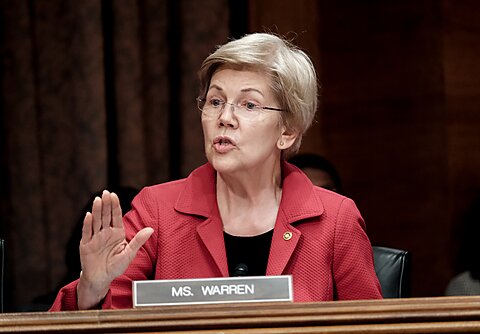Senator Warren Targets Crypto with Questionable Data, Again

Shortly after the violence erupted in Israel on October 7, an article in the Wall Street Journal pinned part of the blame for terrorist financing on cryptocurrency. That was all that was needed for Senator Elizabeth Warren (D‑MA) to get over 100 members of Congress to sign a letter calling for a crackdown on cryptocurrency in the wake of this tragedy.
Yet it now seems the initial reporting was exaggerated as the Wall Street Journal issued a correction on October 27 to address some of the issues. However, this incident is not the first time one of Senator Warren’s anti‐cryptocurrency letters has been based on questionable data.
What Happened
Originally, the Wall Street Journal piece in question said that the Palestinian Islamic Jihad received “as much as $93 million in crypto between August 2021 and June this year,” and that Hamas received “about $41 million over a similar time period.” The piece credited the estimates to the companies Elliptic and BitOK, but no reports from the companies were linked.
A week later, over 100 members of Congress signed a letter led by Senator Warren that cited the Wall Street Journal’s reporting nearly a dozen times as the only source to claim that the Palestinian Islamic Jihad and Hamas collectively raised over $130 million in cryptocurrency.
A day later, Chainalysis published their findings to correct the record. Simply put, Chainalysis warned that the number reported in the Wall Street Journal article was likely wrong because the difference between the total transaction volume at a service provider (e.g., an exchange) and transactions at a known terror‐affiliated wallet can be vast.
In the example Chainalysis provided, one service provider was identified as having $82 million in total transactions, but only $450,000 of that amount went to a known terror‐affiliated wallet. Turning back to the source for one of the figures in the Wall Street Journal piece, this type of issue is likely why Elliptic cautioned readers that “it is not clear exactly how much of these funds belong directly to the [Palestinian Islamic Jihad]”—a warning the Wall Street Journal article left out.
Another week later, Elliptic published its own correction stating, “there is no evidence to suggest that crypto fundraising has raised anything close to [the amount cited in the Wall Street Journal], and data provided by Elliptic and others has been misinterpreted.” In fact, Elliptic said that its team reached out to both Senator Warren and the Wall Street Journal to clarify this point.
To be fair, mistakes happen—especially in the fog of war. And that is why it is good to see the Wall Street Journal issued a correction on October 27. However, what is especially unfortunate about this incident is how similar it is to another time Senator Warren wrote a letter about supposed illicit use of cryptocurrency.
An Unfortunate Trend
Back in August, Senator Warren led a different group of senators in a letter calling for the Internal Revenue Service (IRS) to “act swiftly to implement strong tax reporting rules for cryptocurrency brokers” to close a “$50 billion crypto tax gap.” The press release accompanying the letter claimed that multiple “studies” substantiated this number, but a closer look reveals the sources were just two 2022 articles from CNBC and Bloomberg that pointed to the same research note from Barclays.
Although it’s unclear if this research note is publicly available, both articles cite Joseph Abate, a managing director at Barclays, as having said that unpaid taxes on cryptocurrency may be as much as “$50 billion per year.” CNBC quoted him further as having said, “Without any supporting IRS data, our sense is that the $50 billion estimate for the crypto tax gap is probably too small.” And in Bloomberg, it was clarified that Abate had “extrapolated from a 2017 IRS calculation to find the current tax gap would be around $50 billion per year” because the “U.S. tax agency hasn’t released any recent estimate of its own.”
If nothing else, judging an emerging industry in 2023 off IRS data from 2017 should be a red flag. However, what’s perhaps more concerning is that the Joint Committee on Taxation estimated that taxing cryptocurrency would only yield $28 billion over ten years. In fact, the Biden administration later revised that estimate down to just $2 billion over ten years.
So again, it seems an anti‐cryptocurrency narrative is being built in Congress based on questionable evidence, to say the least.
Conclusion
The good news is that the tide is already starting to turn: more and more people are taking notice of this issue. On October 26, Senator Bill Hagerty (R‑TN) spoke up during a Senate Banking Committee hearing to clarify the record. However, whether the more than 100 members of Congress that signed Senator Warren’s letter will soon make similar clarifications is still to be seen.





